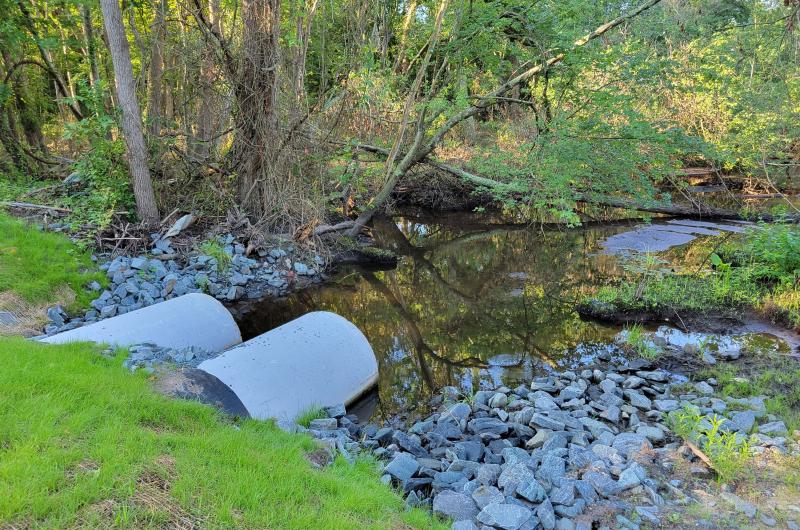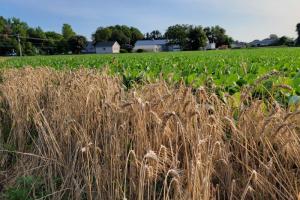Leave it to beavers to control the flow of water
A couple of months ago, the Delaware Department of Transportation replaced the crossroad pipes at the point in Milton where Cave Neck Road turns into Atlantic Street. The pipes are located at the bottom of two hills and serve as the waterway for Round Pole Branch, a distributary of the Broadkill River from the north that meanders south almost all the way to Route 9.
I run over this section of road daily, and the difference in water flow from before to after replacement is remarkable. Prior to the pipes being replaced, a good portion of the lot for sale on the Atlantic Street side of the waterway was constantly flooded. Since then, nothing. Just a quiet stream, with lots of frogs and bugs. The grass is beginning to grow again.
My daily run also takes me on Front Street, which also has a crossroad pipe underneath it for Round Pole Branch. Since those other cross pipes have been installed, the water level for the marsh area between the two roads has also remained low. I don’t run with earbuds or other means of distraction. It’s just me and my thoughts. Seeing the consistently low water in the Front Street area of the small waterway got me thinking the marsh wasn’t getting as full because the new cross pipes provided a place for the tidal waters to go.
I reached out to DelDOT spokesperson C.R. McLeod about my hypothesis. He politely shot it down.
The pipe replacement helped with the drainage on the upstream side of Atlantic Street, but it didn’t really have an impact on the area on the Front Street side, said McLeod. DelDOT had a conversation with the Delaware Department of Natural Resources and Environmental Control about the beaver activity they saw, and there was believed to be a beaver dam between Atlantic and Front streets, he said.
“If the dam broke apart, then the drainage in the area of Front Street would move a little better, which may be what you are seeing,” said McLeod.
Whatever the reason – new crossroad pipes or the breaking of a beaver dam – the waterway is definitely flowing better.
2022 sees large increase in planting of winter wheat in Delaware
The Delaware Field Office of the U.S. Department of Agriculture’s National Agricultural Statistics Service issued a press release recently estimating 80,000 acres of winter wheat were planted in Delaware for 2022 – a 33% increase from 2021.
Shareefah R. Williams, Maryland and Delaware state statistician for the USDA, said the 80,000 acres is not a historic high. However, it’s been nearly a decade since it broke that level. Within the last 10 years, Delaware farmers have also reported planting 80,000-plus acres in 2012, 2013 and 2014, said Williams.
Delaware Farm Bureau Executive Director Don Clifton said winter wheat is planted in the fall and harvested at the beginning of summer. He said farmers are reporting 90 to 110 bushels per acre.
“Some better,” he said. “Historically, it was an excellent year.”
Clifton said farmers respond to what they see in the futures market, and the price of winter wheat last fall was attractive. This was before the war in Ukraine caused a disruption in wheat distribution, he said.
When farmers were making winter planting decisions last year – September 2021 – the price for wheat was $6.87 per bushel, said Clifton. Since then, the high per bushel reached $12.79, but it’s beginning to drop back down, he said.
At the time of the interview, mid-July, the price of wheat, according to the Chicago Mercantile Exchange, was sitting at $7.94 a bushel. Clifton said he thinks there will continue to be momentum in the wheat market. However, he continued, even if the per-bushel price holds steady through to September, farmers will have a lot to consider because operation costs have also increased.
It’s a volatile market, but once the seed is in the ground, that’s the end of that, he said.
Joke of the Week:
It’s August, which means the end of summer is near. So we might as well enjoy some beach-related jokes while we can. This one was sent in by Stephanie. As always, send joke submissions to cflood@capegazette.com.
Q: How can you tell if the beach is friendly?
A: The ocean waves at you.
Chris Flood has been working for the Cape Gazette since early 2014. He currently covers Rehoboth Beach and Henlopen Acres, but has also covered Dewey Beach and the state government. He covers environmental stories, business stories and random stories on subjects he finds interesting, and he also writes a column called Choppin’ Wood that runs every other week. He’s a graduate of the University of Maine and the Landing School of Boat Building & Design.






















































